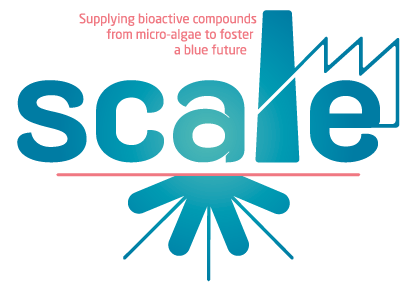Expected impacts

SCALE will complement and strengthen the base of the BBI JU Flagship projects in its mission to produce new bio-based intermediate/consumer products that have proven to be cost-competitive and comparable and/or superior to fossil-based products in terms of performance, availability and environmental impact.
SCALE’s impacts, in line with the BBI-JU “SIRA” roadmap, are also expected to contribute to the Sustainable Development Goals (SDGs) set by the United Nations (UN). SCALE impacts report a contribution to the SDG8 “Decent Work and Economic Growth” SDG9 “Industry, Innovation & Infrastructure”, SDG12 “Responsible Consumption & Production”, SDG13 “Climate Action” and finally SDG 14 “Life Below Water”.
More information about the UN SDGs:
- SDG8: Promote inclusive and sustainable economic growth, employment and decent work for all
- SDG9: Build resilient infrastructure, promote sustainable industrialisation and foster innovation
- SDG12: Ensure sustainable consumption and production patterns
- SDG13: Take urgent action to combat climate change and its impacts
- SDG14: Conserve and sustainably use the oceans, seas and marine resources
| Impact | Key figures | Justification | UN SDG and global challenges |
| Create new cross-sector interconnection in the bio-based economy. | 5 new cross-sector interconnections | SCALE will establish new cross-sectoral interconnections in the bio-based economy between the microalgae sector and the food, food supplements, feed, cosmetics and technology provider sectors. | |
| Create new bio-based value chains. | 4 new bio-based value chains | SCALE will create new bio-based value chains from raw materials to final food, food supplements, feed and cosmetic products. | |
| Demonstrate new consumer products based on bio-based ingredients, chemicals and materials that meet market requirements. | 8 new ingredients | SCALE will demonstrate new ingredients for each of the targeted applications (food, food supplements, feed and cosmetics). |
Impact | Key figures | Justification | UN SDG and global challenges |
Greater independence from raw materials |
| SCALE will support the emergence of microalgae as a commercial renewable feedstock to be used: – In food and food supplements sectors as a natural alternative to synthetic compounds and animal extracts such as Omega-3 from fish. – In the feed sector as an alternative to some animal and vegetal meals. – In the cosmetics sector as a substitute for some petroleum derivatives. |
|
Reduce greenhouse emissions | At least 20% compared with the state of the art (shown by an LCA) | The cultivation of microalgae itself does not emit any greenhouse gas, thus no direct emissions of greenhouse gas. Nevertheless, there are indirect emissions, mainly linked to energy consumption and transportation. Sunti will investigate ways to optimize energy efficiency and to reduce carbon emissions from the industrial activities of the plant. Also, Tecnalia will carry out a Life Cycle Sustainability Assessment (LCSA). |
|
Protect and (if possible) increase aquatic and marine biodiversity |
| MIC’s production process of microalgae biomass and ingredients does in no way affect marine biodiversity and is fully aligned with the Nagoya protocol. Also, the SCALE production process enables to reproduce the natural conditions of marine environment in which microalgae live while mastering all the culture parameters without any direct impact on the marine environment. Finally, SCALE feed products, notably for aquaculture, will enable a more environment-friendly and sustainable production. |
|
Replace fossil-based material with biobased, renewable material (contribution to the EU’s 2050 long-term strategy for a climate-neutral Europe) |
| SCALE will offer credible, novel, natural and renewable microalgae-based alternatives to fossil-based products in cosmetics (petroleum-based ingredients used for texturing and silicone oils), food supplements and feed (synthetic carotenoids), bringing the same or better properties with less impact. |
|
| Impact | Key figures | Justification | UN SDG and global challenges |
| Reduce reliance on high-cost or unsustainable raw materials | SCALE will support the emergence of microalgae as an alternative, affordable and sustainable feedstock to: -Petroleum derivatives that are unsustainable and whose price is indexed to oil prices which is volatile. -Animal and vegetal meals, whose stocks collapse and whose prices logically increase. | ||
| Increase raw-material flexibility | SCALE will propose natural solutions to enlarge the offer in the targeted sectors (alternative to synthetic pigments, petroleum-based texturizing, animal meals and oils such as PUFAs). | ||
| Increase employment, income, and the strength of the local or regional economy | The project will strengthen the local and sustainable development in the region of Occitania (South of France), establishing a viable bio-based industry supply chain, creating the need for extensive logistics, transportation and other services and offering prospects to local workers. |
| Impact | Key figures | Justification | UN SDG and global challenges |
Increase the competitiveness of European biomass producers and biobased industry |
| The outcomes, skills and knowledge gained through SCALE will create new opportunities for networking and collaborative platforms to develop the market for bio-based ingredients for multiple applications. |
|
Support new jobs, growth and investment. | 50 to 60 direct jobs per plant and 190 indirect jobs | Creation of direct and indirect jobs, as well as significant growth and investment along the entire value chain. |
|
Promote the inclusion of coastal or rural areas in a bio-based industry setting. | Numbers of plants replicated | MIC is located in a coastal and rural area. Beyond SCALE, the objective is the replication in rural areas close to water. SCALE will complement the agro-food and maritime sectors, thus contributing to the social adoption of microalgae bioactive compounds. |
|
